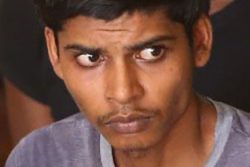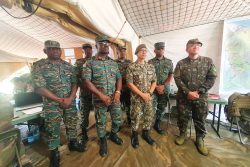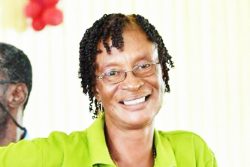Kamadyah Israel, occasionally appearing on a stage near you, sort of danced out of nowhere doing poetry with a voice so haunting that you listen to the message and you just cannot shake it.
She is the kind of woman you would imagine dancing onto the scene and not popping up; that scene being the Upscale Restaurant where local poetry is not only being revived, but revolutionized thanks to a cadre of really strong, emerging voices.
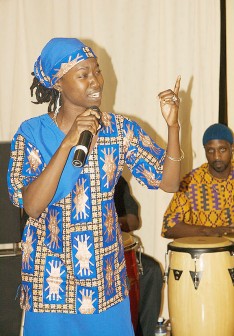 Kamadyah agreed to sit down with The Scene recently to discuss her poetry and to share a bit about her life; her private life which she rarely opens up about publicly. This meant we got lucky and she is such a fascinating person it is hard to accept why she is against a more public profile.
Kamadyah agreed to sit down with The Scene recently to discuss her poetry and to share a bit about her life; her private life which she rarely opens up about publicly. This meant we got lucky and she is such a fascinating person it is hard to accept why she is against a more public profile.
When Kamadyah Israel is in a ‘zone’ you’ll know because her poetry flows with more passion and it is that passion which makes her compelling to watch. For her to perform publicly she has to be in that ‘zone’ or more appropriately, she has to be in her element and when she is there, she flies.
She soars in that element with poetry so alive and affecting it makes you sit up and take notice, and she has no particular description for her work except to say that her poetry is complex yet the message is simple. Her poetry is largely about the experience of the black community and she understands that, “not everyone feels it” when she performs.
Kamadyah takes pride in what she calls her ‘nationalistic’ poetry, but a part of her is weary of the misconceptions about her work. To put it simply, she says, some people confuse nationalism with racism.
“Sometimes I just wake up and I feel good and I want to write about God,” she says. Her face lights up when she says the word, “God”, which is understandable if you’ve seen her perform. There is a deep spiritual vibe to her work and her Hebrew faith has just about everything to do with it.
The best of her poetry probably sits among a collection of work she did on the Jenna 6 incident in the US, something she acknowledged saying that her work is stronger when she is deeply affected. She makes no claims to being a prolific writer and admitted to having droughts for as long as three months when she doesn’t write a single thing.
She talks about struggling with poems and leaving them incomplete, sometimes for years until she revisits the works and commit to finishing them. But she feels no pressure to write saying that it happens when it happens, and most of what she writes about she identifies with.
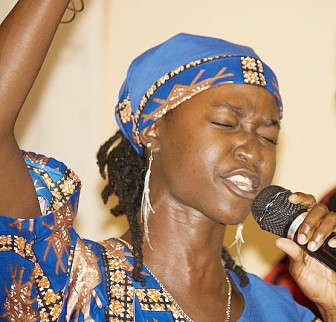
One of her more talked about pieces is, “I get out”, which intensely explores the issue of self-identity or as she says, “self-emancipation”. In the piece, Kamadyah opens up about living in a world where the system dictates everything including what her last name should be. “…a name which is so personal and it is connected to our slave masters and to plantations, things which [you] no longer associate yourself with,” she says.
Kamadyah explains that her surname used to be, “Young” and is now “Israel”. She made the change to, “Attach myself back to our true ancestors rather than the slave plantations we came from”. She says it was a powerful experience to reclaim the name Israel.
She believes there is room for improvement in her work and works extremely hard on her stage shows. Her shows are well choreographed productions which flow without interruptions, except when she pauses. She doesn’t hesitate to say it requires months of training and endless preparation- the fact that she has only had two major productions at Upscale says it all; it takes time and a whole lot of effort.
She credits her growth as a poet to friends and family who encouraged her for years after she first started writing. Her words affected them and while she was a bit skeptical to make the material public she decided to anyway; the rest is history. Her first set of performances were in the US where she was born, but she grew up in Guyana and was schooled here. She has released three CDs of her work and according to her the messages are the same despite the subject, “Restoring African pride is definitely one of my messages, it goes back to the general theme which is nationalism and then there is spirituality, our reconnection with God… and love, in all its forms,” she gushes.
Kamadyah has a lot of pieces that are unreleased, which are personal, but she says some of those pieces would end up on the stage if she feels that the people listening are going to take something away from her experiences. In other words, she is willing to share those private thoughts if they will benefit someone who is listening.
Kamadyah, away from the stage, is a trained attorney who lectures at the University of Guyana in International Trade Law. She completed her Masters in International Trade Law in the US. She is also “happily” married.
(ianaseales@yahoo.com)



